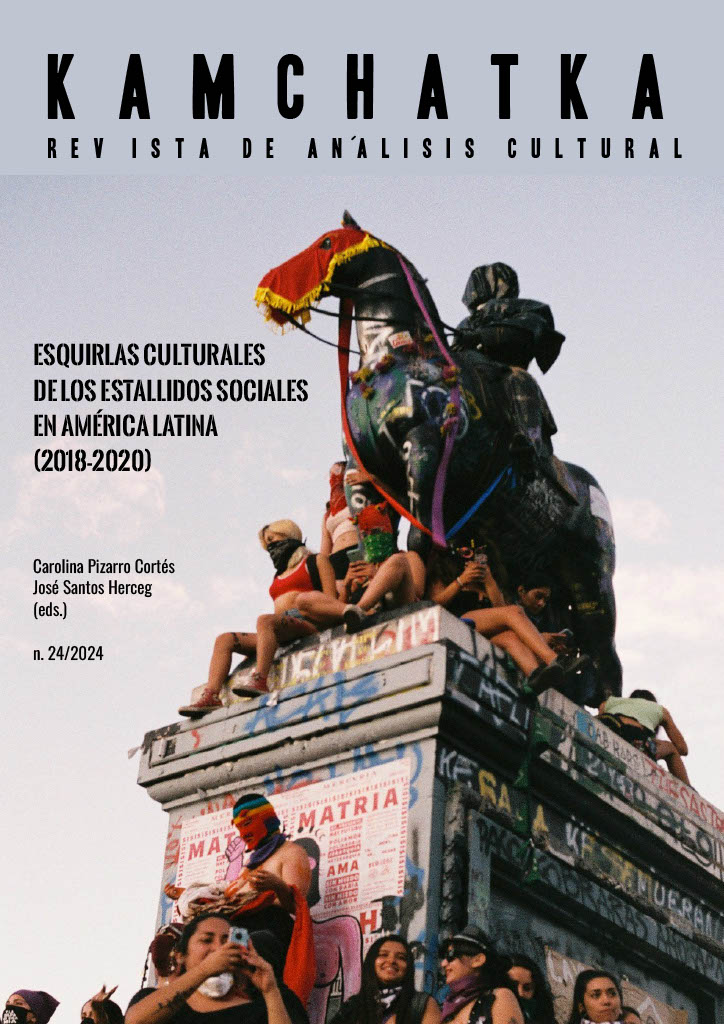Imperialism, ambiguity and liberation. On the construction of political identity in Las aventuras de la China Iron (2017), by Gabriela Cabezón Cámara
DOI:
https://doi.org/10.7203/KAM.24.28367Keywords:
Imperialism, Gender, Sexuality, Anagnorisis, Liberation Abstract
Abstract
In Las aventuras de la China Iron, a novel written by Gabriela Cabezón Cámara, the political identity of
the main character —related in the Argentinean cultural tradition to the topical figure of Martín Fierro and resignified according to contemporary ecofeminist and queer parameters— is presented through her self-discovery in stages, symbolised by the incursion, the exploration and
the progressive encounter with the enigmatic Pampa. On the basis of this premise, this article aims to analyse, with the help of theoretical approaches by Nohemy Solórzano
Thompson, Cristina Rivera Garza, Edward W. Said, Gayatri Spivak and Paul B. Preciado and employing the methodology of close reading, the way in which certain practices such as the use of metaphor, allegory and animalisation reflect the narrative deconstruction of an “other” subjectivity, imprisoned, initially, by imperialist and hetero-
patriarchal mandates. We argue that this deconstruction will involve an awareness of the injustices and moulds of the existing ideological system, and will culminate in the
rupture of its imperial codes and its ingrained gender and sexual binarism. Consequently, liberation, achieved both individually and collectively, will be exercised through the assumption of ambiguity, whose meaning unfolds in a recovered, natural and utopian landscape.
 Downloads
Downloads
 References
References
AYETE GIL, Maria (2023). Ideología, poder y cuerpo. La novela política contemporánea. Manresa: Bellaterra Edicions.
CABEZÓN CÁMARA, Gabriela (2023). Las aventuras de la China Iron. España: Random House.
CULLER, Jonathan (2010). “The Closeness of Close Reading”. ADE Bulletin, Nº 149: 20-25.
ESCAMILLA FRIAS, Luis Enrique (2021). “Trans-fundar la Argentina. Nación, autoría y masculinidades en Las aventuras de la China Iron de Gabriela Cabezón Cámara”. Cuadernos del CILHA, Nº 34: 1-27.
HERNÁNDEZ, José (1981). Martín Fierro. España: Alianza Editorial.
MINELLI, María Alejandra y MOSCOSO, Marcia (2022). “Decires gauchescos y políticas de género”. La Aljaba, Vol. 25, Nº 1: 291-303.
MONTECINO VIEIRA, David (2023). “Contra civilización y barbarie: espacios y cuerpos fronterizos en El año del desierto de Pedro Mairal y Las aventuras de la China Iron de Gabriela Cabezón Cámara”. Cuadernos del CILHA, Nº 38: 1-53.
LEONE, Lucía de (2021). “Vuelos erráticos sobre una pampa migrante. Las aventuras de la China Iron de Gabriela Cabezón Cámara”. Chuy: revista de estudios literarios latinoamericanos, Vol. 8, Nº 10: 64-78.
PÉREZ GRAS, María Laura (2021). “Las paradojas del desencanto. Ucronía y utopía en Las aventuras de la China Iron”. Letras, Nº 83: 38-51.
PRECIADO, Paul B. (2002). Manifiesto contra-sexual. España: Opera Prima.
REGAZZONI, Susanna (2019). “Un estallido multicolor. El desierto argentino de Gabriela Cabezón Cámara”. Oltreoceano, Nº 15: 205-216.
ROTGER, Patricia (2022). “Desierto sonoro: sexualidad lesbiana y gauchesca en Las aventuras de la China Iron, de Gabriela Cabezón Cámara”. Inter Disciplina, Vol. 10, Nº 27: 45-52.
SAID, Edward W. (2001). Cultura e imperialismo, Nora Catelli (tr.). Barcelona: Anagrama.
SOLÓRZANO THOMPSON, Nohemy y RIVERA-GARZA, Cristina (2009). “Identidad”. Szurmuk, Mónica y Mckee Irwin, Robert (coords.). Diccionario de estudios culturales latinoamericanos. México: Siglo XXI Editores: Instituto Mora: 140-146.
SPIVAK, Gayatri (1988). “Can the Subaltern Speak?”. Nelson, Cary y Grossberg, Lawrence (eds.). Marxism and the Interpretation of Culture. Illinois: Mcmillan: 271-313.
Downloads
Published
How to Cite
-
Abstract1
-
Artículo PDF (Español)0
Issue
Section
License
Copyright (c) 2024 Andrea Durán Rebollo

This work is licensed under a Creative Commons Attribution-NonCommercial 4.0 International License.
This journal provides an immediate free access to the content on the principle that freely make investigation available to the public, which promotes an increased global knowledge exchange.
Unless otherwise indicated, texts published in this journal are under the license Attribution-NonComercial 4.0 by Creative Commons. These texts may be copied, distributed and publicly communicated whenever the publication’s author and title are quoted and whenever they are not used for commercial purposes. In any case, intellectual property of the articles and its potential economic rights entirely belong to its authors.
The full license can be consulted on https://creativecommons.org/licenses/by-nc/4.0/. We encourage authors to disseminate papers published in Kamchatka. Journal of cultural analysis electronically, in institutional digital repository or in their websites.





